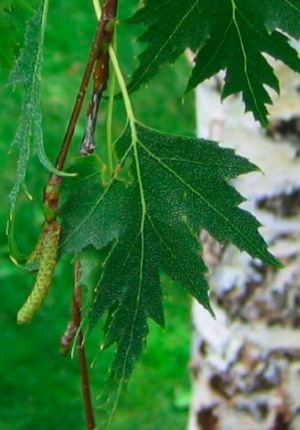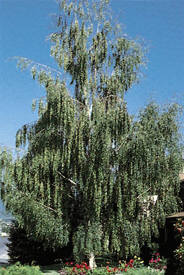I grew up in a small white house at the very edge of a tiny town in northwest Ohio. Beside the house my parents had planted just a few years before my birth a cut-leaf weeping birch tree, Betula pendula laciniata—a transplant from Europe, as my ancestors had been. The laciniata refers to its small, many-pointed, lacy leaves.
As a child I loved to stand under the weeping threads of its branches, next to the slim white trunk. Its young bark was thin and crinkly as tissue paper. In junior high, sent to rake the birch tree’s generous fall of yellow leaves, I would rake and daydream, sometimes arranging the leaves in the rectangles and squares of a floor plan, with windows and doorways laid out as in blueprints. And when I was in high school, the tree, now thirty feet tall, witnessed my longings as I sat beneath it on summer afternoons, immersed in books, reading everything from romance novels to C. S. Lewis. I can’t say I shared secrets with the tree, but I did feel different—calmer, a little more confident or clear—after being veiled for a few hours under its leafy fall.
Fifteen years out of high school, when I was in my early thirties and living two thousand miles away on the West Coast, the birch tree became a friend in a new way. One evening as I crossed the living room after dinner, an image popped into my mind. It was the birch tree, and in the space of a moment the tree was as present inside my head as the sofa was present before my eyes. I sank down and closed my eyes. What was happening? I hadn’t thought of the birch tree for years and had no reason to be thinking of it now.

A birch tree in New York that looks much like the one I grew up with. Photo courtesy Miller Nurseries.
There was no announcement, there were no words. The tree simply rose suddenly in my awareness, its tall, graceful image strong in my mind—stronger somehow than a memory. The presence remained vivid for a few moments and then gradually faded. A feeling of quiet gravity, almost sadness, had accompanied it.
Two weeks later I received a call from my brother, who still lived in our hometown. We talked a few minutes before he said slowly, “Well, I’m afraid we’re going to have to cut down the birch tree. It’s got a disease or something.”
Ah, so that was it. The tree had come to say good-bye. I hung up the phone and paused for a moment to focus my attention on the birch tree again and say thank-you.
I knew the birch tree very well from my years of living with it. What I hadn’t realized until then was that the tree also knew me.
—From the paper I presented at last weekend’s conference called “Recreate, Replace, Restore,” on religion, ethics, and nature at Ohio Northern University. If you’d like to see the paper, please feel free to email me using the Contact Me form in the sidebar.
Update: This story became the foundation of a chapter my book, Kissed by a Fox: And Other Stories of Friendship in Nature, published in 2012. More about the book, including reviews and book trailer, at the Kissed by a Fox page.
Thank you for sharing this lovely piece of your life (and that of the birch friend). Very touching.
Blessings to you
I’m so happy that there are others who experience such things & don’t remain silent about it. I’d be honored if you visited my blog & read The Sainthood of Sequoias. It’s the first post at the moment. Going to friend you on Twitter too. 🙂
Thanks, GreatOwl and Pamir, for letting me know you connected. My academic research involves reflecting in a disciplined way on what experiences like this mean and how we can learn to talk about them. I think it is important not to remain silent, and I’m hoping that seeing someone like me–an academic who loves both the careful observations of science and the heart-lifting experiences of spirituality–talking about connecting with nature will give other people the courage to speak also. I deeply believe that addressing our ecological crisis (as well as our economic crisis–the two are related) will involve, in part, revolutionizing our view of nature–recognizing kinship and communal interdependence with all others sharing this world.
Your story about the birch tree rings so true, in the deepest sense, that it brought to consciousness something that’s been growing within me. And if it’s true of the trees, what else?
The story of your birch tree friend is incredibly moving. The connections we can make with other living things are so powerful; I believe these connections are true mysteries and all the better for it. It’s enough to just to experience.
… oh, but *coughcough* I hope that didn’t sound like I think this stuff should not be looked and discussed. Quite the opposite, I believe our connections with the natural world and it’s inhabitants need to be something we can all feel comfortable with, marvel over, discuss and bring right out into the open. I am fascinated with the theme of your blog by the way, and I’m off to read some more.
Your relationship with the birch tree is very moving. Have you ever read “Spell of the Sensuous” by David Abram? He talks about how the natural world perceives us just as we perceive it. It spoke to what I had been unable to articulate about the way I feel when I’m in the natural world – in the company of other sentient beings.
Yes, David Abram is one of my heroes. Encountering his book many years ago set me down the road of recording and sharing my own experiences in relationship with other beings. His book was groundbreaking in making room in environmental philosophy for conversations about animism.